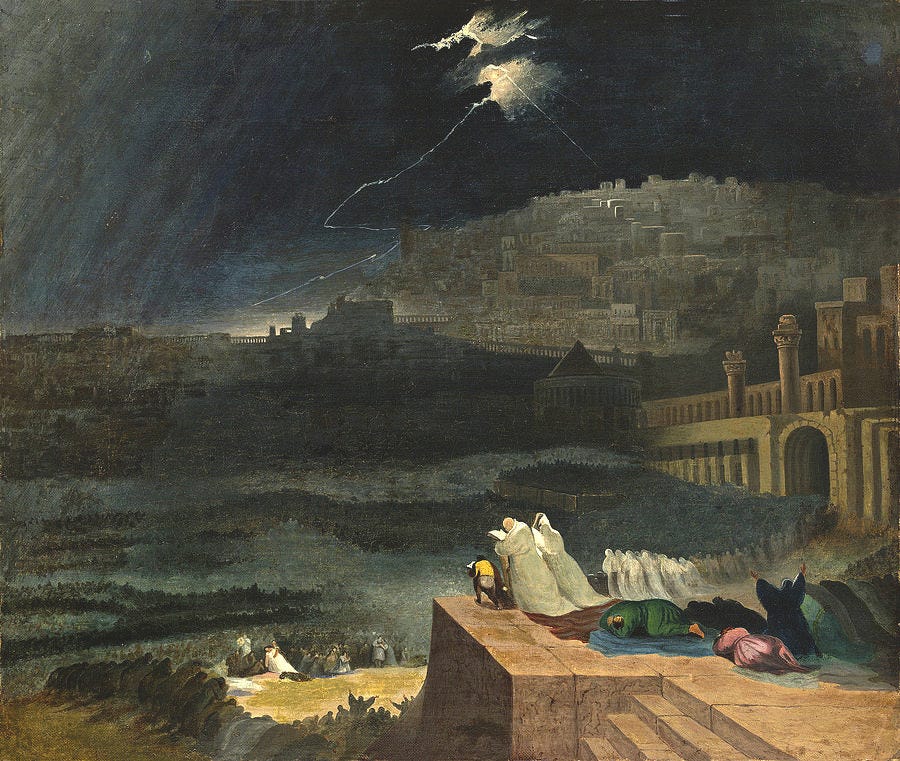Jonah 3 Part 4 - God Relents
Jonah 3:10. - Repentance is not a “one and done” action and it can apply to individuals churches, great cities and nations
“When God saw their deeds, that they turned from their wicked way, then God relented concerning the calamity which He had declared He would bring upon them. And He did not do it.”
Jonah 3:10 NASB1995
Nineveh receives God’s mercy instead of judgment because the people from the King on down (and the animals) demonstrated their repentance and belief. God saw their deeds and relented concerning the calamity He had planned for them. What does it mean to “relent”? Well, let’s do another Hebrew term bunny trail, shall we? At least I can sort of understand Greek, but Hebrew is certainly a strange language!
According to The Blue Letter Bible lexicon for this verse, along with the Brown-Driver-Briggs lexicon, the word used in this case is עלהֿרעה from the primitive root word naham (נָחַם). This is in a verb group of definitions that are called Niphal (we ran into that category before) and for Jonah 3:10 this is probably the best definition:
to be sorry, be moved to pity, have compassion [for the ill done to others - an add-on from the complex BDB lexicon].
So God relents because He is moved to pity or compassion for the people of Nineveh, who seem to be genuinely repentant and know who the true God is and believe in Him.
Nineveh is not off the hook in the long term, though. The Book of Nahum (another OT minor prophet) devotes its three chapters to the prophetic warnings to Nineveh about 150 years after Jonah preached the warning to them. In the future case, the prophecies were fulfilled when the city was destroyed by the Midians and Babylonians (Chaldeans). Their repentance was heartfelt and probably lasted for a while, but eventually the Assyrians slid back into their evil and wicked ways. God deals with individuals, churches (Revelation 2 & 3), great cities like Nineveh, and nations with His incredible patience, love, mercy and forbearance. He wants all to come to salvation!
As I have also noted before, repentance is not a one-time “get out of jail free” action that we take with God. It is a life-long and iterative process, assisted by the Holy Spirit who convicts us of our sins as we are sanctified.
The commentary for this last verse in Jonah 3 from Enduring Word is interesting - by repenting, we do not obligate God to forgive us, but we appeal to His mercy.
Then God saw their works, that they turned from their evil way; and God relented from the disaster that He had said He would bring upon them, and He did not do it.
God saw their works…and God relented: God honored Nineveh’s repentance, even though their past sin was reason enough for an outpouring of judgment. The state would never forgive a cold-blooded murderer who vowed to never do it again, but God mercifully relented from judgment against the people of Nineveh.
We do not obligate God to forgive us when we repent. Instead, repentance appeals to God’s mercy, not His justice.
God relented from the disaster that He had said He would bring upon them, and He did not do it: Did God’s relenting make Jonah a false prophet, when he prophesied Yet forty days and Nineveh shall be overthrown? Not at all, for two good reasons.
First, God acted in total consistency with His word: The instant I speak concerning a nation and concerning a kingdom, to pluck up, to pull down, and to destroy it, if that nation against whom I have spoken turns from its evil, I will relent of the disaster that I thought to bring upon it (Jeremiah 18:7-8). Jonah’s preaching was like all warnings of judgment: it was an invitation to repent and avert the promised judgment. His words had an implied “if you do not repent” in front of them. Remember that we are not told the sum total of Jonah’s preaching; though we should assume that the statement in Jonah 3:4 is the central theme of what Jonah said, we should not assume it was all that he said.
Second, God did judge Nineveh (as recorded in the book of Nahum). Nevertheless, in light of their repentance He delayed the promised judgment for another 150 years.
So what does our intrepid prophet Jonah do after he sees the repentance of Nineveh and God relent with His promised judgment? Jonah does not react well at all, as we will see in Jonah 4:1-3, in my next devotional.
Heaven on Wheels Daily Prayer:
Dear Lord - Your compassion and mercy are never-ending! I am so grateful for Your forgiveness, love and forbearance. Help me to be truly penitent about sin and to not backslide like the people of Nineveh did after their repentance. Amen.
Scripture quotations taken from the (NASB®) New American Standard Bible®, Copyright © 1960, 1971, 1977, 1995 by The Lockman Foundation. Used by permission. All rights reserved. lockman.org
Commentary from Enduring Word by David Guzik is used with written permission.




